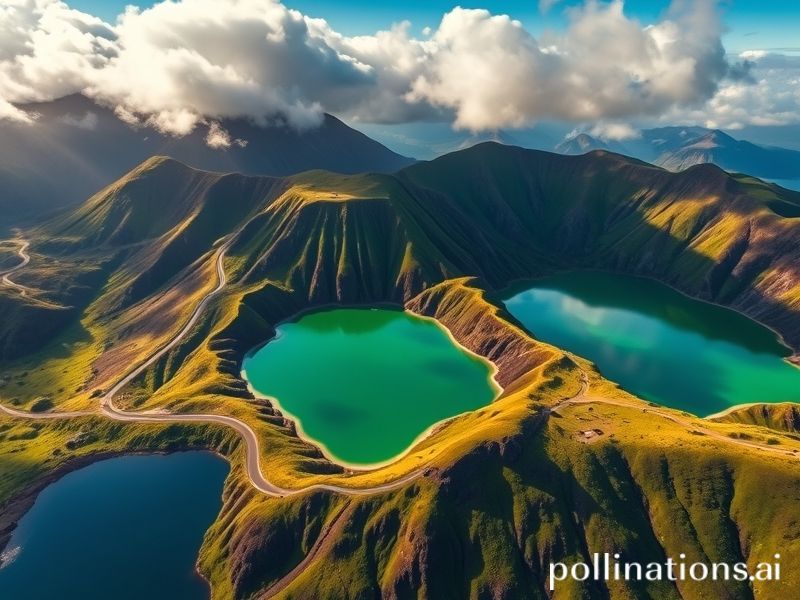The Azores: Europe’s Volcanic Airbnb for Guilt, Geopolitics, and Getaways
The Azores: Nine Volcanic Pawns in the Atlantic Chess Match
By the time you finish reading this sentence, a Chinese container ship, a Russian spy trawler, and an American drone will all have glided past the same mid-ocean speck of basalt that Europeans once mistook for the lost continent of Atlantis. Welcome to the Azores—nine Portuguese islands whose only natural resource appears to be their inconvenient location between everyone and everywhere else.
Tucked 1,500 km west of Lisbon and 3,900 km east of New York, the archipelago has spent five centuries perfecting the art of being useful to people who don’t live there. First came the sugar barons, then the whalers, then NATO, which parked a Cold-War-era airfield on Terceira and still keeps trans-Atlantic bombers fueled for whatever fresh apocalypse is trending on the global timeline. Today the islands rent out their lava fields for satellite dishes, their ports for transoceanic fiber-optic cables, and—most lucratively—their air for would-be climate saviors.
Yes, the Azores are the planet’s newest carbon-sequestration pop-up. Wealthy governments, having belched the sky full of CO₂, now pay locals to plant cryptomeria trees that may or may not stay alive long enough to offset next year’s private-jet summit. Each sapling comes with a QR code and a LinkedIn post, because nothing combats existential dread like measurable engagement metrics.
Meanwhile, Brussels treats the archipelago as a handy guilt sponge. Under the EU’s Green Deal, industrial Germany can keep manufacturing cars that run on both petrol and smugness, provided someone in the middle of the Atlantic promises to photosynthesize on their behalf. The Azoreans, who already endure diesel-generated electricity at quadruple the mainland price, nod politely and cash the check. After all, a subsidy is just imperialism with better branding.
Tourists arrive next, clutching Ryanair boarding passes that cost less than a Lisbon salad. They come for the whales that used to be harpooned here, the hydrangeas that replaced the sugar cane, and the Instagrammable volcanic pools that double as emergency tsunami shelters. Each selfie is a small act of geopolitical amnesia: the islands’ strategic value vanishes behind a Valencia filter.
Yet the Azores remain stubbornly real. When the pandemic grounded flights, locals noticed the sky was suddenly quiet enough to hear tectonic plates flirting beneath their feet. Whales returned in numbers not seen since Herman Melville needed new material. For one brief season, the archipelago belonged to the people who actually slept there, and the economy—bereft of cruise-ship day-trippers—remembered how to fish, how to barter, how to live without being a waypoint.
Naturally, this could not last. Post-Covid, the islands were rebranded as Europe’s “Hawaii without the jet lag,” a slogan that manages to insult both geography and human intelligence. Direct flights multiplied; real-estate portals listed converted whale-lookout towers as “eco-lofts”; digital nomads arrived with laptops full of crypto and heads empty of Portuguese. Rents in Ponta Delgada now rival those in Porto, which is impressive for a city whose airport runway doubles as the main street on windy days.
And still the chessboard shifts. China’s Belt and Road Initiative eyes the deep-water port of Praia da Vitória for a “logistics hub,” a phrase that translates to “naval base” in every major language. Washington responds by reminding Portugal of its 500-year-old alliance, a diplomatic maneuver roughly as subtle as a carrier group. The Azores, population 245,000, find themselves courted by superpowers the way a bartender is courted at last call: with loud promises and suspect sincerity.
So what does the world actually want from these nine green chips in the Atlantic? A place to park its planes, its guilt, its excess bandwidth, its endangered metaphors. The Azores oblige, as islands always have, by staying put while everything else moves. One day the volcanoes will remember they’re volcanoes and reclaim the land with a shrug of lava. Until then, we’ll keep landing, uploading, offsetting, and pretending the middle of nowhere is precisely where we meant to be.







